Welcome to Part 2 of our exploration of Farnese! In Part 1 we covered her artistically-rendered backstory and now we're picking up with the Conviction arc (and the anime) onward!
Our first introduction to Farnese in takes place three years after burning down her family mansion. Sent away to a convent, she rose through the church to become the figurehead of the Holy Iron Chain Knights, a military order under the Holy See traditionally lead by a Joan of Arc-like maiden as its figurehead. Her first impression is not flattering. Tasked with capturing the Black Swordsman, she’s immediately portrayed as inept, freezing up when Guts begins killing her men and panicking when attacked directly. Her only act of self defense is to shut her eyes and blindly flail with her sword. It’s only through the intervention of Serpico and Azan that she survives and Guts is temporarily captured.
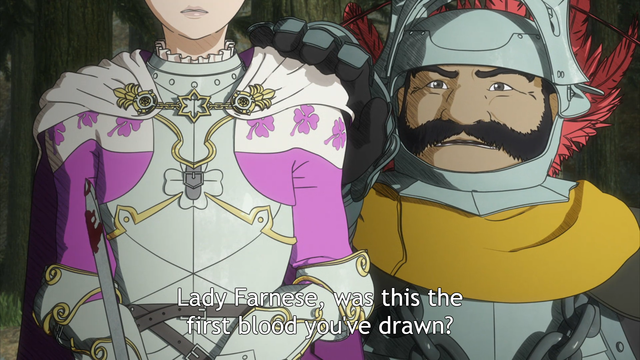
At first blush, Farnese's introduction paints her similarly to Adon, a bumbling knight whose noble birth rather than personal merit has afforded them seniority. With the benefit of context it's easy to see how her own circumstances drove Farnese to this position just as much as her family's wealth provided her the opportunity. The structure and recognition afforded by the Holy See would certainly appeal to Farnese, giving her a purpose after an aimless and lonely childhood. Coming from a world where her father's orders came down from on high without warning, establishing predictable boundaries with rote scripture removed some of the fear of the unknown from her life. Her relationship with the Holy See isn't perfect, however, as she struggles to fulfill the obligations of her role and combats sadistic tendencies unbecoming of a holy knight.
Farnese’s interrogation of Guts forces her to confront the immense amount of personal doubt she is attempting to deny. He instinctively sniffs out Farnese’s insecurities, mocking her title of Commander when her men clearly respect and obey Vice Commander Azan and laughing at her religious zeal as little more than overcompensation for her lack of faith. Even worse, he’s personally made witness to her sadism which only Serpico had previously experienced. When Farnese is momentarily possessed, the darkest aspects of her nature emerge, a perversion toward which she harbors immense shame. Farnese’s reactions are violent, seeing Guts as an existential threat to her way of life. She lashes out at him when he mocks her in captivity and demands his death after the night of miracles to avoid confronting those aspect of herself again.
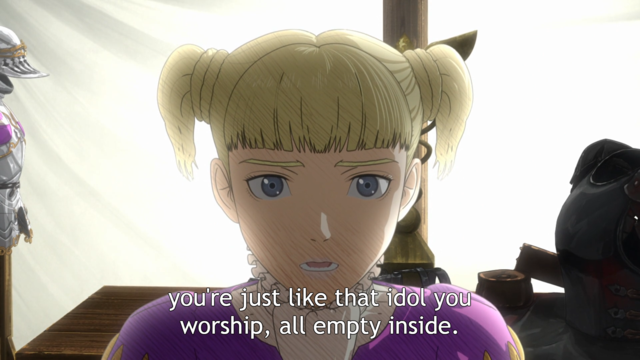
We can see her struggles with her station go beyond her personal doubts and vices. The Holy Iron Chain Knights are inquisitors tasked with burning heretics and witches at the stake. After failing to capture Guts, they are sent to the Tower of Conviction where war refugees are gathering. Short on food, the people are growing increasingly desperate. Farnese burns suspected heretics along with bread thieves. Despite her sadism and affection for flame, the amount of death and suffering overwhelms her. Although she can quote the appropriate punishment for each crime, Farnese finds it increasingly difficult to resolve her faith with the atrocities she has become party to.
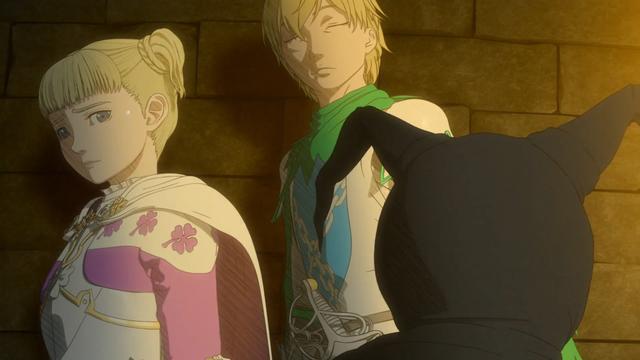
As the events of the Tower of Conviction play out, Farnese is repeatedly faced with the horrors both of the reality she knows and the unknown supernatural. Her repeated interactions with Guts and Mozgus pull her toward different ideologies. Where her natural instinct is to flinch away in fear, both demand that she not avert her gaze.
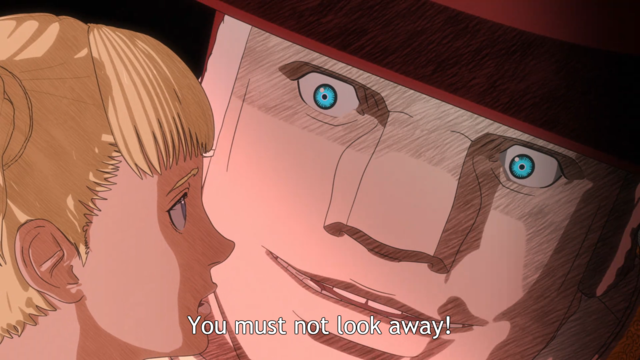
When Mozgus takes Farnese to his dungeon to witness the torture of heretics, he counsels her to accept everything before her is part of God's will. Hunting down heretics to burn in the pyres is an unpleasant task that is part of her holy duty. Her misgivings are natural because the work is ugly, but they are something that must be overcome in the name of her faith and in service a higher power. Suffering is just another way of affirming one's faith. Guts is the other side of the ideological coin. When he sees something he disagrees with, he takes action against it with complete disregard for doubt and fear. His sense of personal responsibility condemns both acting against your instincts in service to another and labelling others as evil for acting in their own interest. He denounces the very idea of prayer, claiming clasping your hands only prevents you from realizing your desire through your own means.
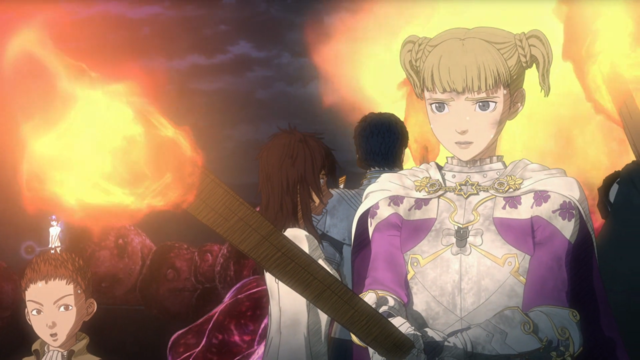
Farnese finds herself instinctively following Guts as the Tower of Conviction begins to crumble, uncertain of how to face what is happening and reliant upon his sense of certainty. Her fear becomes fascination as he repeatedly faces terrors that leave her frozen and triumphs over the unknowable. She begins to realize the distinction between the priest and the swordsman. Where Guts stares headlong into danger without giving into fear, Mozgus faces horrific cruelty by turning away from his compassion. The rejection of her faith begins even before their final battle, evidenced by her ability to see Puck where before she had been blind to his existence due to the rigidity of her beliefs.
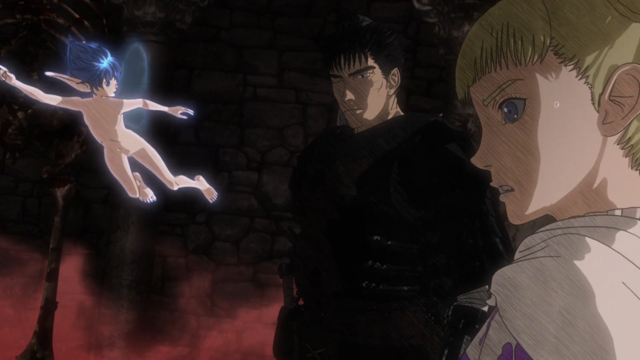
When the dust settles, Azan suggests they return to the Holy See. Knowing that she was so easily dispensed with in exchange for some of her father’s wealth, Farnese can no longer deny the irrelevance of her station. The sense of purpose she experienced as an agent of the church has been poisoned. Her father has ordered her home, but the last thing she wants is to return to that lonely mansion. Farnese has spent her entire life afraid and her blind obedience has only introduced her to even greater fears without providing her with the tools to cope with them. But now she has met someone who may hold the key to escaping her cycle of suffering.
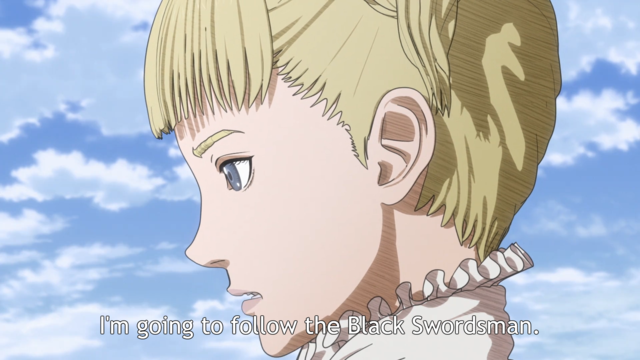
Farnese’s growth is far from painless. Although Guts accepts her request to accompany him without objection, a life of affluence has left her ill-prepared for the hardships of travel. Away from the social hierarchies of society, they must all rely on each other and Farnese struggles to make herself useful. Left with nowhere to hide from her shortcomings, Farnese can only accept the pain of each of her failures and admit to her reliance on others. The social order that defined her place in the world only served to push her away from others but now her struggles are meaningful, working to become an equal contributor and close the gap between her and her companions.
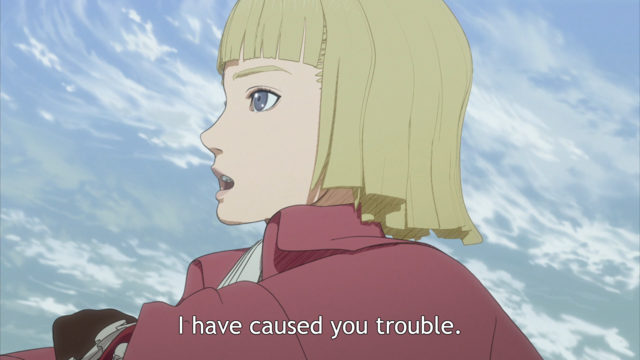
Just as with Guts, it's through Casca that Farnese ultimately finds redemption. Although acting as Casca’s caretaker originally grew out of Farnese’s inability to contribute much else with her lack of domestic skills, it's provided her with a task with which she has been able to find a purpose. Having so keenly felt her own helplessness, Farnese’s fondness for Casca rise out of a visceral sense of empathy. Casca is utterly guileless, so her dependence upon, and affection for, Farnese are honest and Farnese’s experiences the burden of caring for someone who truly dependant upon her. It’s through her concern for Casca, rather than self-preservation, that Farnese is finally able to find the courage to look forward and fight.
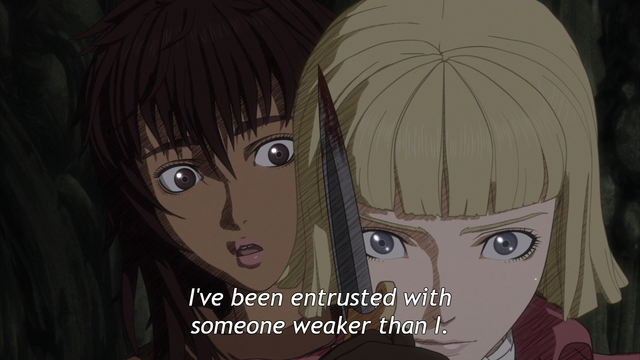
It’s worth noting that since becoming Casca’s caretaker, Farnese’s fascination with fire and moments of excitement when observing the suffering of others have vanished. As stopgaps to truly affirming human experiences, her fundamentally compassionate nature has finally shown itself. Although she still has a considerable amount of growth ahead of her, presenting a fascinating developmental arc behind the events of the series, Farnese also represents a note of optimism in the gothic fatalism of Berserk. Her story isn’t so different from many of the Apostles that Guts encounters, marked by tragic, seemingly inescapable circumstances. Farnese’s decision to fight against her feelings of hopelessness is evidence that humanity may not be doomed to repeat the same mistakes.
---
Peter Fobian is an Associate Features Editor for Crunchyroll and author of Monthly Mangaka Spotlight. You can follow him on Twitter @PeterFobian.
No comments:
Post a Comment